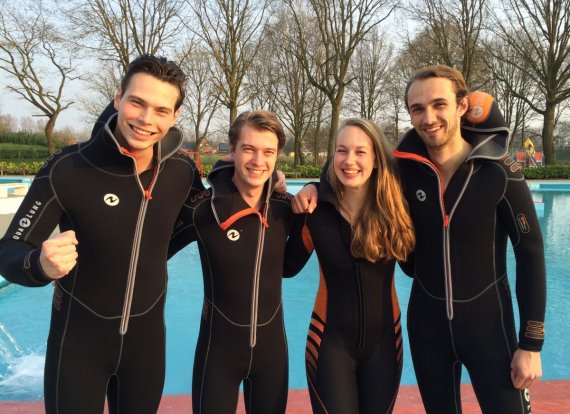Martijn Visser, Joyce van Wijk, Bas Wolkenfelt and Justin Rijnberg, who met through Ceres student society, share a love of underwater life. Together they are taking part in the 1% club’s studentbattle. The 1% club is an online platform where crowdfunding projects are presented which contribute to ‘a better world’. So-called do-good crowdfunding. Eight student teams compete here for the approval of the crowd. The team that manages to submit the best plan as well as to raise a lot of money through crowdfunding wins the battle. The finale is on 5 June.
All the student teams think up plans and raise funds for existing projects. The teams could indicate which social initiatives they were keen to support with their expertise and fundraising skills. Team Reefolution, as the Wageningen four call themselves, is helping the enterprise Coral Gardening. ‘This is a startup company belonging to two Dutch people with a passion for diving. They have given up their jobs in order to protect the coral reefs around the Thai island of Koh Samui,’ says Joyce. ‘They will emigrate to Thailand in September. Then, come what may, they are going start building up the reef and planting out coral.’ The couple has already thought up a method of building up the reef using concrete, but they hope the students can come up with more sustainable, and above all cheaper, plans.
Coral reefs are threatened with extinction, partly because of pollution and climate change. In many parts of the world concrete or PVC are used to lay down new reefs which coral can attach itself to. This does not look particularly attractive, though, says Master’s student Martijn, an experienced diver. ‘Our project focuses on developing a kind of sculpture garden made of recycled material. That way, not only will it look more beautiful underwater, but the whole thing will be more sustainable.’
The idea of the sculpture garden comes from Coral Gardening, but the idea of using local waste products in these artificial reefs comes from the students.
‘Design a coral reef’. With this headline on the website, the Wageningen students hope to attract potential sponsors to their project. Their coral appeal is competing with projects including one supporting the processing of compost in Mozambique and a startup in Kenya that wants to do something about road safety in Nairobi. With only 51 days to go, 717 euros have been pledged so far. According to the website, 5000 euros is needed.
Team reefolution has been studying the literature for weeks to find out which is the most sustainable, seawater- proof concrete and how, for example, the many glass bottles on the Thai island could be used in the reef. ‘The bottles could be useful in the reef as holes for small fish,’ says Joyce. The students have got so involved in the subject that their supervisors – consultants from Accenture – have told them to be more pragmatic. ‘We were looking for the solution to building coral reefs. But that is a holy grail that people have been thinking about all around the world for years. Accenture pointed out to us that we should come up with a solution that is feasible for these two entrepreneurs.’
There is no shortage of ideas, but to win the finale the students must do the financial thinking too. The finalists of the 1% club are expected to cover some of the costs of their project through crowdfunding. The four students have already raised their starting capital through family and friends, and more contributions are trickling in every day now through onepercentclub.com. Team Reefolution hopes to bring in more money by organizing an introductory diving lesson for students – for a small charge of course. They have also visited several primary schools in Wageningen this week to raise interest in a sponsored walk. ‘We might want to do some fundraising at the student societies as well, but we haven’t got round to that yet,’ says Joyce. For nearly a month the four students have been spending all their spare time on this project. ‘We are all very keen indeed. Even when the competition is over soon, we shall keep in touch with Coral Gardening,’ says Joyce. There is no time now to experiment with another type of concrete, for instance, but Joyce would still like to do that once the studentbattle is over.


